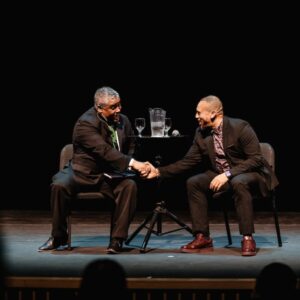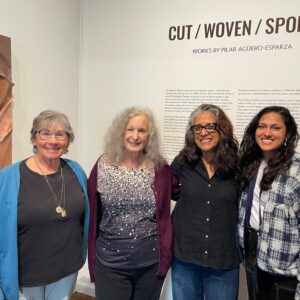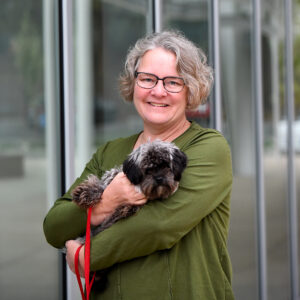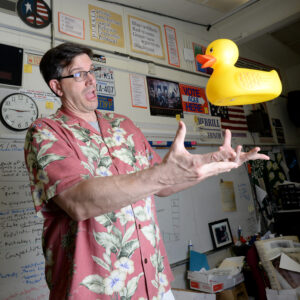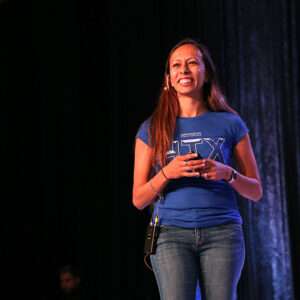This article originally appeared in the spring 2010 Harker Quarterly.
The author Kurt Vonnegut, in a 1994 commencement address at Syracuse University, offered the following insight: “I first declare to you that the most wonderful thing, the most valuable thing you can get from an education is this – the memory of one person who could really teach, whose lessons made life and yourselves much more interesting and full of possibilities than you had previously supposed possible.” I suppose that when schools cite “love of learning” in their mission statements, as most do, this is the spirit they are after.
Albert Einstein famously said that, “Imagination is more important than knowledge.” Aside from inadvertently giving courage to those who do not believe that children need to learn facts anymore, what the man who imagined riding elevators in space was trying to say, I believe, was that information alone, divorced from imagination, does not constitute a complete education. Einstein was warning against a narrow pursuit of facts without context, knowledge without synthesis, learning without understanding. Mark Twain had a quip with a similar gist: “I never let schooling interfere with my education.”
Today’s parents and students are understandably anxious about the future. If anxiety is caused by, among other factors, a low level of predictability, then families today suffer from predictability deficiency. The decline in civic life, the shrinking of the extended family, the onslaught of media and technology, the intensifying of world competition, the Great Recession – over the past decades these factors, among others, have eroded predictability in what sometimes seems a wild, uncaring world.
Parents often react to this uncertainty by attempting to manufacture certainty. They become “agents” for their children. As agents, parents guide their children through a raft of résumé-building exercises from violin practice to building schools in developing countries, all to help differentiate their precious little ones in the weary eyes of a college admissions reader. As a parent, I also find myself seduced by this “agent frenzy.” Do my children know their colors? Shouldn’t I have initiated piano lessons by now? Are we really veering into a Saturday afternoon without a planned activity? Won’t the kids be, well, bored?
Some of this cultivation is good. I know I could have used a swift kick in the curriculum vitae by my parents when I was in school. But there is a growing backlash against these trends, including counter movements that carry titles such as “free-range parenting” or “slow parenting.” Tom Hodgkinson, author of “The Idle Parent,” reminds us of D. H. Lawrence’s advice on childrearing: “How to begin to educate a child. First rule: leave him alone. Second rule: leave him alone. Third rule: leave him alone.”
However, when educators tell parents to relax, everything will work out fine, they ought to feel a twinge of hypocrisy, given that children today, it appears, face an uncertain, competitive future, with far fewer common assumptions about that future. Parents either do not listen to or do not believe the rising tide of advice against the agent approach. And who can blame them? It takes a brave parent to climb down from the nuclear arms race of résumé-building.
Colleges now give warning about two types of students who show up as freshmen on their campuses, “teacups” and “crispies.” Crispies are burned out from an uninspiring, connect-the-dots approach to education. Teacups never really faced disappointment in their careers; hence they shatter, like a teacup, when they receive their first setbacks. These profiles result, I believe, from an unhealthy focus on outcomes over process, grades over learning, activities over passion. Victor Frankl, author of “Man’s Search for Meaning,” said it best: “Don’t aim at success – the more you aim at it and make it a target, the more you are going to miss it. For success, like happiness, cannot be pursued; it must ensue … as the unintended side-effect of one’s personal dedication to a course greater than oneself.” I love that. Success must ensue.
What Einstein called imagination, what Twain feared missing in school, what made life for Vonnegut more full of possibilities than he had previously imagined, what schools call love of learning – this will sustain a young person and carry him or her to success. In “Outliers: The Story of Success,” Malcolm Gladwell lists the colleges the last 25 winners of the Nobel Prize in medicine and chemistry attended – many you have heard of, and many you have not. My favorite is Berea College. Ever heard of it? Berea College has a Nobel Prize winner. In fact, if you look at its Web site, you will see that the school boasts other accomplishments of its alumni too, like the invention of the touch screen.
It is fine and probably advisable to prepare our youngsters for the “Brave New World” they will face. We sense, like no other time in recent history, that we are buffeted by the unknown forces of what Andy Grove of Intel described as a ”strategic inflection point,” or many such points. A parent recently asked me what subject his child ought to learn to be prepared for future. I thought about his question for only a few seconds. All of them, I replied. I suppose I meant that since none of us can predict the future, a thorough grounding in traditional education, fueled by love of learning, is still the best preparation for success in an uncertain world.
In “Drive: The Surprising Truth About What Motivates Us,” Daniel Pink outlines three ingredients of motivation: mastery, autonomy and purpose. We rush to give our children mastery over something: calculus, violin, golf, soccer. But we fail to teach them to master themselves. In the end, Pinocchio is transformed into a real boy only by a fairy’s magic and his long journey, one he undergoes alone. A little magic, a journey and a promise to be good are what make Pinocchio (and all of us) human.
Oscar Wilde said, “The moment you think you understand a great work of art it’s dead for you.” The moment we focus on grades over learning, competition over cooperation, quantity over quality, appearance over passion, outcomes over process, learning dies. I know letting go is easier said than done in this competitive world. But when was the world not competitive? Are we the first to live in interesting times? Besides, love of learning is still, I believe, the number one competitive advantage we can give to our children.



